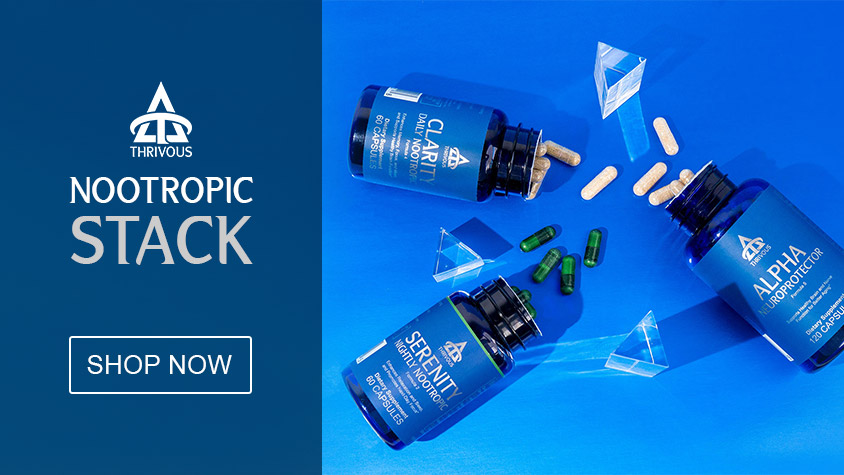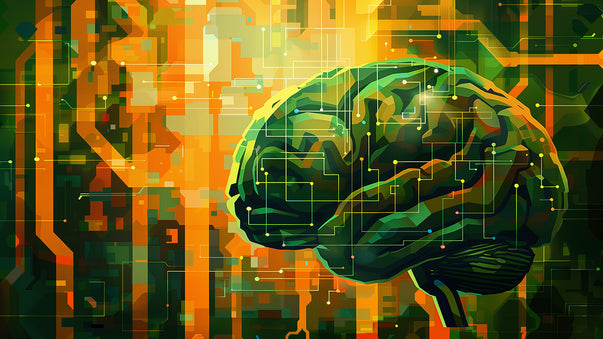What Are Nootropics?

Nootropics are cognitive technology. They support healthy brain function or enhance mental ability. You might have heard others refer to them as "smart drugs" or "the limitless pill."
Nootropics include various foods, supplements, and drugs. Healthy adults use them to improve memory, learning, focus, mood, concentration, information processing, motivation, and attention. Some people use them to decrease brain fog and increase mental clarity. Older adults also use them to support healthy cognitive aging.
What’s the meaning of the term "nootropic" (pronounced nō-ə-ˈtrō-pik)? Corneliu Giurgea, a Romanian psychologist and chemist, coined the term in 1972. He combined the Greek words for "mind" and "turn." So if we transliterate the meaning into English, it would be something like "mind-turner."
Giurgea identified substances with these six features as nootropics:
- "Enhancement of learning acquisition"
- "Resistance to impairing agents"
- "Facilitation of interhemispheric transfer of information"
- "Enhanced resistance to brain 'aggressions'"
- "Increased tonic, cortico-subcortical 'control'"
- "Absence of usual pharmacological effects of neuro psychotropic drugs"

To summarize Giurgea, a nootropic should safely support and improve cognitive performance. If a substance doesn’t have these features, it doesn't qualify.
That doesn’t mean that everything anyone calls a “nootropic” actually lives up to the name. Some Scientists haven’t studied some substances enough to know whether claims are more than anecdotal. And research demonstrates that some substances have little to no effect or may even pose significant health risks. But studies have shown the efficacy and safety of other nootropics to varying extents.
History of Nootropics
The history of cognitive enhancement began thousands of years before Giurgea. After all, we didn't need to know anything about brain cells to use our brains. And humanity had already begun exploring ways to modify cognition for purposes of religion, medicine, and recreation.
Our prehistoric ancestors may have used psychoactive substances to inspire their artwork. Indian Ayurvedic medicine, known for adaptogens like Ashwagandha, may have begun as an oral tradition around 5000 BCE. And as early as 1500 BCE, Ancient Egyptians cataloged hundreds of stimulants, sedatives, motor excitants, motor depressants, narcotics, and hypnotics.
During the last few centuries, our modern ancestors have been working toward more powerful, dependable, and flexible ways to enhance cognition. As the scientific method matured, alchemy became chemistry. In the eighteenth century, James Lind conducted what may have been the first clinical trial. And in the nineteenth century, Richard Canton observed electrical impulses in brains.
In the twentieth century, scientists greatly expanded efforts to address the challenges of mental health. Doctors began diagnosing Alzheimer's and attention deficit hyperactivity disorder (ADHD) early in the century. And by mid-century, chemists had introduced many new drug interventions to improve brain function.
Also in the twentieth century, science fiction and emerging technology sparked imagination. A fun example appeared in "Our New Age" comic strip on 26 December 1965. It predicted that humanity would develop nootropic smart drugs and brain computer interfaces by 2016.

Nootropic Examples
Perhaps the most well known cognitive enhancers are the Afinil wakefulness drugs. French scientists developed them in the late 1970s. And various brands sell them in the United States as prescription medications. These prescription nootropics are artificial, but they appear to have a low risk of side effects.
Afinils are particularly notable for reducing mental fatigue, according to multiple human studies. Doctors sometimes prescribe them to help with sleep apnea and shift work. They may also provide subtle improvements to mental function, such as reaction time and short term memory in healthy adults. And studies suggest that Afinils may provide other benefits, although the evidence may not be as reliable.

Other well known cognitive enhancers include the Racetams. They are legally available in the United States. But the Food and Drug Administration (FDA) does not allow vendors to market Racetams as dietary supplements.
First developed by Giurgea in Romania in the early 1970s, Racetams are artificial smart drugs. They may provide a notable decrease to cognitive decline, according to multiple human studies. They may also provide other benefits, although evidence for them may not be as reliable. And they appear to have a low risk of side effects.
Many of the best nootropics with solid evidence and notable effect come from herbs, amino acids, vitamins, and other natural substances. Complementary and alternative medicine often recommends them. As dietary supplements, these are widely available and legal nootropics in the USA. You can buy them in stores or online without a prescription.
Here are some examples:
- Ashwagandha is an herb that may decrease stress.
- Bacopa Monnieri is an herb that may increase memory.
- Creatine is an amino acid that may increase energy.
- Feverfew is an herb that may decrease migraine.
- Fish Oil (Omega 3) is a fatty acid that may support mood.
- Ginkgo Biloba is an herb that may support healthy cognitive aging.
- Inositol is a sugar that may decrease stress.
- Melatonin is a hormone that may promote sleep.
- Rhodiola Rosea is an herb that may increase energy and improve focus.
- L Theanine is an amino acid that may promote relaxation.
- Vitamin B2 is an essential vitamin that may decrease migraine.
- Zinc is an essential mineral that may support mood.

Nootropic Effects
At this point, you are probably wondering, do nootropics work? Everyone's different, but some work for most healthy people. For example, my list of real smart drugs references more than 100 studies for more than 12 substances.
Most of the studies are peer reviewed, double blind, placebo controlled trials. Some are meta analyses or cohort studies. All are the formal work of credentialed scientists – not just journalists writing news articles or enthusiasts tapping out blog posts.
All of the studies are related to clinical trials on humans – not just on mice or in test tubes. And most of the studies found significant statistical support for notable effect. The few that didn’t are still helpful for scoping effective applications, dosages, and timelines.
How do nootropics work? Different substances work in different ways. For example, some may increase blood flow to the brain, while others may increase alpha waves in the brain. The answer can vary widely.
And how well do they work? Different substances have different effects on different timelines and at different magnitudes. So the answer depends in part on the effect you’re looking for: focus, memory, mood, or otherwise.
The answers also depend in part on how disciplined you think you can be. Some, such as Caffeine, work best when you use them only for a short term. And there are others that you can take daily, like Bacopa, which becomes more effective over the long term.
In 2013, a study quantified the magnitude of effect for a popular nootropic drug. The scientists used Cohen’s D, which is a standard statistical method from behavioral science. The method generates outputs on a scale of 0 to 1:
- 0 is no effect
- .2 is small effect
- .5 is medium effect
- .8 is large effect.
The scientists applied this method to the results of seven human studies. They found that the nootropic drug had a magnitude of effect of .77, which was nearly a large effect. The study also used the drug as a benchmark for assessing two nootropic herbs.

One of the herbs was Panax Ginseng and the other was Bacopa Monnieri. When the scientists applied Cohen's D to studies of Ginseng, they found that the Ginseng magnitude of effect was .86. And when they applied the method to studies of Bacopa, they found that the magnitude of effect of Bacopa was .95.
These results indicate that Ginseng and Bacopa may both have large effects. And their effects may be larger than the effect of the nootropic drug. However, each affects different cognitive functions on different timelines. The study concluded:
"Neurocognitive enhancement from well characterized nutraceuticals can produce cognition enhancing effects of similar magnitude to those from pharmaceutical interventions."
Future of Nootropics
In 2011, the Limitless movie brought nootropics to popular attention. You might remember. In the movie, the main character uses NZT-48. It’s a fictional smart drug that activates 100% of his brain and radically increases his intelligence.

As it turns out, you already use your whole brain. And real nootropics are not yet as powerful as NZT-48. But that hasn’t stopped them from becoming popular. And, given humanity's ancient and persistent interest in cognitive enhancement, it seems unlikely that scientists will stop researching them any time soon.
Maybe right now, someone in a silicon valley garage is integrating a smart drug with a brain computer interface. And the powerful brain boosting drugs of the future are just an epiphany away. Imagine.
Smart drugs in science fiction suggest possibilities. A "neurolink" might provide instant access to vast amounts of information, simply by thinking about it. "Nanomods" might enable machine-like focus, enhanced memory, and improved emotional regulation. Telepathic communication might allow interconnected group minds for collective problem-solving and creative endeavors.

Of course, with such great power would come great responsibility, as the risk of addiction and misuse would also increase. Like all technologies, cognitive enhancers of the future will not be inherently good or evil. They will simply be increasingly powerful. And it will be up to us to use that power for good.
Ethical consideration of the role of cognitive enhancers in society is an essential topic for ongoing discussion. Mitigating risks while pursuing opportunities will be crucial. Striking a balance between equitable access, responsible use, scientific progress, and the promotion of general well-being will be key. With such considerations in mind, we may yet navigate accelerating technological change to a brighter and more enlightened future for humanity.
How to Buy Nootropics
Brain supplements come in many formats. Natural nootropics are available in foods. And both artificial and natural are available in powders, liquids, and pills – capsules, tablets, softgels, caplets, and chewables.
If you’re looking for flexible dosage and low cost, powders may be the way to go. And for some like Creatine, which require high doses measured in grams, powders are also practical. For others, which require smaller doses, nootropic pills may save you a lot of time and frustration.

People often combine two or more ingredients into a "stack." A stack may include ingredients that are more effective together, such as Caffeine for energy and Theanine for relaxation. Both are components of green tea, for example. And a stack may include ingredients that simply complement each other, such as Bacopa for memory and Rhodiola for focus.
You can make your own stack by purchasing ingredients separately. Or you can purchase a pre-made stack.
Pre-made stacks are the most convenient, but the market is full of stack products with all too typical problems. Many contain ingredients that don't work, or for which there's little or no supporting evidence in scientific studies.
Some contain ingredients that could work, but they provide tiny ineffective doses. And more often than not, it's difficult if not impossible to tell, because they hide their doses behind secret formulas.
On top of that, stack products tend to be expensive, with many vendors charging exorbitant prices for their secretive ineffective products.
Thrivous
At Thrivous, we’re proud to offer better alternatives. We develop high quality natural nootropic supplements. They combine nutrients and doses with the highest levels of scientific evidence for the greatest magnitudes of enhanced cognitive function.
- Clarity Daily Nootropic enhances memory, focus, and mood. Each bottle provides a month supply (60 capsules) of Synapsa® Bacopa Monnieri, L Theanine, and Rhodiola Rosea.
- Alpha Neuroprotector enhances brain and nerve function for better aging. Each bottle provides a month supply (120 capsules) of Acetyl L Carnitine, Alpha GPC, Ginkgo Biloba, and SerinAid® Phosphatidylserine.
- Serenity Nightly Nootropic enhances relaxation, sleep, and next-day focus. Each bottle provides a month supply (60 capsules) of KSM-66® Ashwagandha, L Theanine, Magnesium Glycinate, and Melatonin.
- Surge Acute Nootropic enhances productivity, energy, and focus. Each bottle provides a multi-month supply (60 capsules) of Caffeine, L Theanine, and Panax Ginseng.
The benefits of each of these supplements complements the others. So Thrivous also provides combination stacks at discounted prices:
- Clarity and Serenity Stack includes both Clarity and Serenity.
- Clarity and Alpha Stack includes both Clarity and Alpha.
- Nootropic Stack includes Clarity, Alpha, and Serenity.
All Thrivous formulas are completely open source. The supplement facts panel on each label fully discloses all ingredients and amounts. And we publish all quality control test results from our suppliers, manufacturing, and third parties. This is an exceptional practice among supplement vendors.
If you’re new to nootropics, Thrivous is an easy and dependable way to start. If you’ve used them for years, Thrivous is a convenient base on which to build your stack. Either way, our full line of nootropics is now available to you online in the Thrivous store.
More Articles
Read more articles at Thrivous, the human enhancement company. You can browse recent articles in Thrivous Views. See other Nootropics articles. Or check out an article below.
-
This Supplement Powers Up the Brain with Choline
The world's population is getting older. In part, this is due to decreasing birth rates. And it's also partly because ...
-
Are Nootropics Safe?
In today's fast-paced world, many people are seeking ways to enhance their brain function and improve cognitive performance. Nootropics are ...



